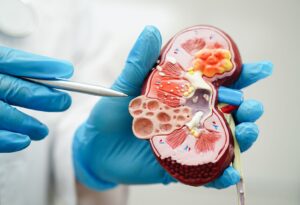This year’s World Health Day theme focuses on health equity and the importance of access to quality healthcare for all. In Ghana where access to medical resources is often limited, one of the most pressing health concerns is kidney disease.
Chronic kidney disease, which is a progressive worsening of kidney function over time, has emerged as a significant public health challenge in recent years. Statistics estimate that about 13% of the adult population may be affected by some form of kidney impairment. Risk factors include diabetes, hypertension, obesity, and the increasing consumption of unhealthy diets.
Unfortunately, the healthcare system in Ghana often lacks the resources to adequately diagnose and manage kidney disease. Many patients present late in the course of their illness, resulting in more severe illness and higher rates of mortality.
Nephrologists (kidney specialists) and dialysis centers are severely limited, with many people in the population unable to afford medical aide when it is in dire need. The system in general struggles to provide adequate screenings and education, which are critical for early detection and intervention.
Education and awareness about kidney health remain essential in combating this silent epidemic. Considering World Health Day’s theme, this year offers a valuable opportunity to enhance awareness campaigns that empower individuals to adopt healthier lifestyles, understand risk factors, and encourage early medical assessment.
The issue of brain drain in the healthcare sector of Ghana has further complicated this fight against kidney disease.
Ghana loses a significant portion of its medical doctors and nurses to countries such as the United States and the United Kingdom, where they can find better working conditions and opportunities for career advancement. The migration of skilled health professionals to more developed nations has left a noticeable gap in the workforce.

This exodus of talent has severe repercussions for healthcare delivery, particularly for chronic diseases like kidney disease, which require specialized care and ongoing management. The shortage of qualified nephrologists and trained medical staff does not allow for adequate treatment and education to patients.
Targeted strategies must be developed and implemented to tackle kidney disease alongside the issue of brain drain. These include:
- Strengthening Health Systems: The government and stakeholders must invest in health infrastructure, particularly in rural areas where resources are sparse. Establishing more dialysis centers and providing essential equipment can enhance local health services.
- Investment in Human Resources: Initiatives to improve working conditions for healthcare professionals, coupled with competitive salaries, can help retain medical talent within the country. Additionally, partnerships with foreign institutions for training and capacity building could mitigate brain drain. Healthcare workers should also be appreciated inside and outside of the workplace for their hard work and sacrifices.
- Public Awareness Campaigns: Nationwide campaigns should be launched, highlighting kidney health. This can increase awareness about the risk factors associated with kidney disease and likely cause individuals to take charge of their health. Engaging community leaders and health advocates can also enhance outreach efforts.
- Accessible Screening Programs: Community-based screening programs can facilitate early detection of kidney disease, especially in high-risk populations. Adding these programs into already established primary healthcare services can improve access and educate communities about prevention.
- Research and Data Collection: Further research on kidney disease in Ghana is critical. Collecting and analyzing data on prevalence and risk factors can inform public health policies and healthcare strategies.
World Health Day serves as a reminder that health equity is fundamental to achieving better health outcomes in Ghana and globally. The rise of chronic illnesses like kidney disease, along with brain drain in the healthcare sector, underscores the need for urgent action to combat healthcare issues within the nation. Strategic partnerships, enhanced public awareness, and systemic reform are only a few ways in which we can foster a healthier future for all Ghanaians.
BYLINE:
By Dr Akua Ampadu
Dr Akua Ampadu is a USA-based board-certified Internal Medicine trained physician passionate about providing quality inpatient adult care. Outside of taking care of patients on the hospital ward, she has a passion for harnessing the power of innovative solutions to ensure health equity and equal access to quality healthcare for all. She is also an expert in corporate wellbeing, helping organizations promote and improve the holistic health of their employees. She can be reached via [email protected]










